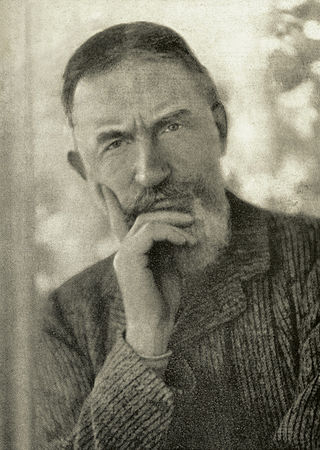
George Bernard Shaw, known at his insistence as Bernard Shaw, was an Irish playwright, critic, polemicist and political activist. His influence on Western theatre, culture and politics extended from the 1880s to his death and beyond. He wrote more than sixty plays, including major works such as Man and Superman (1902), Pygmalion (1913) and Saint Joan (1923). With a range incorporating both contemporary satire and historical allegory, Shaw became the leading dramatist of his generation, and in 1925 was awarded the Nobel Prize in Literature.
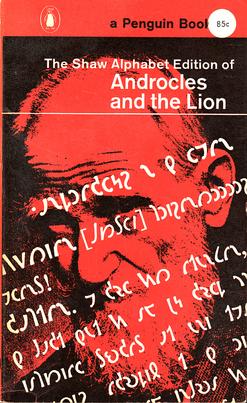
The Shavian alphabet is an alphabet conceived as a way to provide simple, phonemic orthography for the English language to replace the difficulties of conventional spelling using the Latin alphabet. It was posthumously funded by and named after Irish playwright Bernard Shaw.
Comic timing or “Comedic timing” emerges from a performer's joke delivery: they interact with an audience—intonation, rhythm, cadence, tempo, and pausing—to guide the audience's laughter, which then guides the comedic narrative. The pacing of the delivery of a joke can have a strong impact on its comedic effect, even altering its meaning; the same can also be true of more physical comedy such as slapstick. Comic timing is also crucial for comedic video editing to maximize the impact of a joke, for example, through a smash cut.

Bernard Shaw was an American journalist and lead news anchor for CNN from 1980 until his retirement on March 2, 2001. Prior to his time at CNN, he was a reporter and anchor for WNUS, Westinghouse Broadcasting, CBS News, and ABC News.

Candida, a comedy by playwright George Bernard Shaw, was written in 1894 and first published in 1898, as part of his Plays Pleasant. The central characters are clergyman James Morell, his wife Candida and a youthful poet, Eugene Marchbanks, who tries to win Candida's affections. The play questions Victorian notions of love and marriage, asking what a woman really desires from her husband. The cleric is a Christian Socialist, allowing Shaw—himself a Fabian Socialist—to weave political issues, current at the time, into the story.

Bardolatry is excessive admiration of William Shakespeare. Shakespeare has been known as "the Bard" since the eighteenth century. One who idolizes Shakespeare is known as a bardolator. The term bardolatry, derived from Shakespeare's sobriquet "the Bard of Avon" and the Greek word latria "worship", was coined by George Bernard Shaw in the preface to his collection Three Plays for Puritans published in 1901. Shaw professed to dislike Shakespeare as a thinker and philosopher because Shaw believed that Shakespeare did not engage with social problems as Shaw did in his own plays.
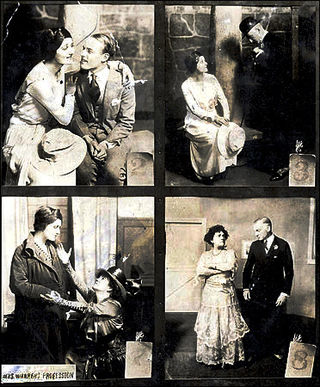
Mrs. Warren's Profession is a play written by George Bernard Shaw in 1893, and first performed in London in 1902. The play is about a former prostitute, now a madam, who attempts to come to terms with her disapproving daughter. It is a problem play, offering social commentary to illustrate Shaw's belief that the act of prostitution was not caused by moral failure but by economic necessity. Elements of the play were borrowed from Shaw's 1882 novel Cashel Byron's Profession, about a man who becomes a boxer due to limited employment opportunities.
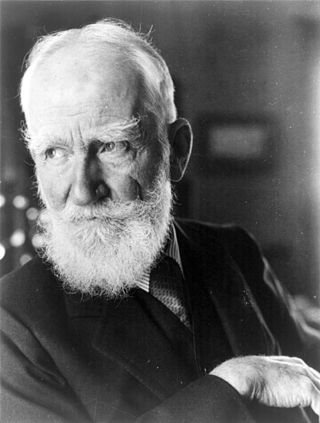
The Philanderer is a play by George Bernard Shaw.
The Society of Authors (SoA) is a United Kingdom trade union for professional writers, illustrators and literary translators, founded in 1884 to protect the rights and further the interests of authors. As of August 2022, it represents over 12,000 members and associates.

The Penn State University Press, also known as The Pennsylvania State University Press, was established in 1956 and is a non-profit publisher of scholarly books and journals. It is the independent publishing branch of the Pennsylvania State University and is a division of the Penn State University Library system. Penn State University Press publishes books and journals of interest to scholars and general audiences. As a part of a land-grant university with a mandate to serve the citizens of the commonwealth of Pennsylvania, it also specializes in works about Penn State University, Pennsylvania, and the mid-Atlantic region. The areas of scholarship the Press is best known for are art history, medieval studies, Latin American studies, rhetoric and communication, religious studies, and Graphic Medicine. In 2016 the Press launched PSU Press Unlocked, an open access platform featuring over 70 books and journals. The Press acquired academic publisher Eisenbrauns, which specializes in ancient Near East and biblical studies, in November 2017. Eisenbrauns continues to publish as an imprint of the Press.
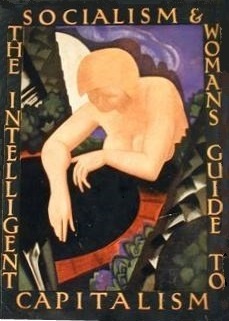
The Intelligent Woman's Guide to Socialism and Capitalism is a non-fiction book written by the Irish playwright George Bernard Shaw. The book employs socialist and Marxist thought. It was written in 1928 after his sister-in-law, Mary Stewart Cholmondeley, asked him to write a pamphlet explaining socialism. The book was later re-released as the first Pelican Book in 1937. The dust jacket artwork for the British and American first editions was by the British artist and sculptor Eric Kennington.

The Political Quarterly is an academic journal of political science that first appeared from 1914 to 1916 and was revived by Leonard Woolf, Kingsley Martin, and William A. Robson in 1930. Its editors-in-chief are Ben Jackson and Deborah Mabbett, who assumed their posts in 2016.

John Peter Wearing is an Anglo-American theatre historian and professor, who has written numerous books and articles about nineteenth and twentieth-century drama and theatre, including The Shakespeare Diaries: A Fictional Autobiography, published in 2007. He has also written and edited well-received books on George Bernard Shaw, Arthur Wing Pinero, extensive reference series on the London theatre from 1890 to 1980, and theatrical biographies, among other subjects. As a professor of English literature, Wearing has specialised in Shakespeare and modern drama.

"Don't throw the baby out with the bathwater" is an idiomatic expression for an avoidable error in which something good or of value is eliminated when trying to get rid of something unwanted.

Too True to Be Good (1932) is a comedy written by playwright George Bernard Shaw at the age of 76. Subtitled "A Collection of Stage Sermons by a Fellow of the Royal Society of Literature", it moves from surreal allegory to the "stage sermons" in which characters discuss political, scientific and other developments of the day. The second act of the play contains a character based on Shaw's friend T. E. Lawrence.

The Festival Theatre, now known as Malvern Theatres, is a theatre complex on Grange Road in Malvern, Worcestershire, England. Malvern Theatres, housed in the Winter Gardens complex in the town centre of Great Malvern, has been a provincial centre for the arts since 1885. The theatre became known for its George Bernard Shaw productions in the 1930s and from 1977 onwards, along with the works of Edward Elgar. Up until 1965, 19 different plays of Shaw were produced at the Malvern Festival Theatre, and six premiered here, including The Apple Cart at the opening Malvern Festival in 1929, Geneva, a Fancied Page of History in Three Acts in August 1938 and In Good King Charles's Golden Days in August 1939.

Passion, Poison, and Petrifaction is a short play by Bernard Shaw, subtitled The Fatal Gazogene: a Brief Tragedy for Barns and Booths. It is a comic mock-melodrama, written to raise funds for charity. It has been revived occasionally, in tandem with other short works by Shaw or by other playwrights.

The Simpleton of the Unexpected Isles: A Vision of Judgement is a 1934 play by George Bernard Shaw. The play is a satirical allegory about an attempt to create a utopian society on a Polynesian island that has recently emerged from the sea.

Macbeth Skit (1916) is a short comic skit by George Bernard Shaw on Shakespeare's portrayal of Macbeth's relationship with Lady Macbeth.

LÉ George Bernard Shaw (P64) is a Samuel Beckett-class offshore patrol vessel (OPV) of the Irish Naval Service. It is the fourth ship in a series of vessels designed by Vard Marine and built by Babcock Marine Appledore, and is named for the writer George Bernard Shaw.















